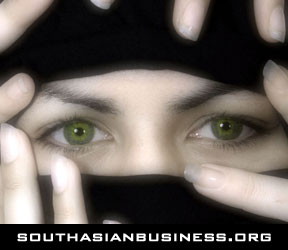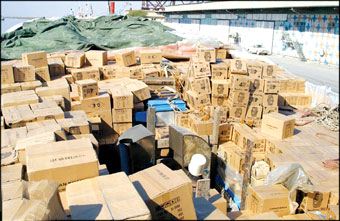
| HOME | EXPORT & IMPORT |TEXTILE ACTS | RESOURCES | DIRECTORY |SITE MAP |
A different take on what not to wear: as new textile trade terms threaten Asian workers with even longer hours and lower wages, can ethical consumers buy any clothes at all with a clear conscience?
So reliable was the association between pips and persecution, you could wonder if it was causation or correlation. Did the scent of citrus groves drive generals to seize power? Should the friends of warm democratic countries beg them to scorch the snake of a fledgling satsuma industry before it was too late? Such speculation was beyond me and my sisters. We did not know it, but when Franco fell ill in 1975, we were in a race to the death. Either he died of Parkinson's disease or we died of rickets. Fortunately for us and for the peoples of Spain, the general went first, although he took an unconscionably long time about it. He kept his fingernails dug into this world for months before being shifted to a much warmer clime. The triumph of the liberal order means that today's conscientious shoppers are more concerned with the terms of trade than democratic rights. They buy Fairtrade bananas from the Windward Islands and Fairtrade coffee from South America. What matters to them is not a country's political system but the condition of its farmers. Most Caribbean banana growers are there only because the European empires enslaved their ancestors. The European Union recognised it had a duty to guarantee them access to its markets because, with the exception of tourism, there are few ways of making a living on a Windward island besides growing bananas. The World Trade Organisation ruled that this preferential treatment distorted the market against the giant producers on the US mainland, which it did. As island farmers can't match the big companies' economies of scale, their only hope is for wealthy consumers to pay a little more for their product. The case of coffee is more tied to the normal boom and bust of capitalism. Vietnam piled into what it thought was a market with rich pickings; there was a glut and the price collapsed, leaving farmers around the world on the edge of destitution. A tough-minded liberal would say the best thing you could do for the Vietnamese is tell them to get out of coffee farming rather than encourage them to hang on by buying their beans. But in my experience, few tough-minded liberals have lived on the edge of destitution. With both bananas and coffee, ethical consumers know that the lower the price, the more immoral the product. And yet they have a strangely selective morality that ignores the one product whose price has fallen sensationally: clothes, a large number of them from the tsunami-wrecked countries of the Indian Ocean. The cheapness of clothing is one of the wonders of the age. The business press is full of modern morality stories about how Marks & Spencer has been overtaken as Britain's largest clothing retailer by Asda, and has Tesco looming ominously in its rear-view mirror. Its fault, its criminal folly, was to fail to deliver cheap, fashionable clothes. Sainsbury's is the business news desk's alternative tragic hero. Like M & S it, too, was a colossus brought down by Asda and Tesco for the fatal flaw of failing to diversify into cheap clothes. Turn the page and you can hear the fashion writers squeak with enchantment at the quality of the goods from the new high-street giants. It's marvellous what they allow you to get away with, said one Express writer when describing how she was at "a black-tie dinner party, wearing a slinky black velvet dress with a matching coat". Friends asked which designer it was from. She overheard a jealous woman in the ladies mutter to a friend that it must have cost at least [pounds sterling]700. Little did she know. It was from Asda's body-hugging, penny-pinching George range and cost--just [pounds sterling]40! H & M is also breathing down the M & S neck. It imitates the latest haute couture, gets the designs sewn up and into the shops at incredible speed and has supermodels and celebrity photographers market them to the young. And like Tesco, Asda, Gap and all the other retailers that are swooned over, H & M succeeded where M & S failed because its clothes were at low, low, low prices--as little as half of those of Marks. With the honourable exception of pieces by Maxine Frith of the Independent and Sue Reid of the Daily Mail, not one of the dozens of "I can't believe it's not butter!" exclamations about high-society looks at low-rent prices which I have read mentioned that the reason they were so cheap, and the reason why the latest designs could be turned around so quickly, was that they were made with sweated labour, earning, in the case of H & M's luckless Indonesian workers, $1 a day for a 60-hour week. The wages in Asia and the prices in the shops are about to fall further. On 1 January, the Multi-Fibre Agreement ended. It was a strange piece of protectionism. Quotas were established in 1974 to protect the rag trade in Europe and North America from cheap imports from China and Taiwan. But this apparently straightforward piece of rich-world protectionism had a perverse effect when the demand for clothes exploded. While the quota restrictions prevented China from meeting new demand, poorer countries--Bangladesh, Cambodia, Sri Lanka, Indonesia--found that they could industrialise and receive a measure of protection as they developed their clothing industries. Neither the Chinese nor the big retailers liked the restraint, and during the utopian capitalist mania of the 1990s their request to the World Trade Organisation to end the agreement was a push at an open door. [ILLUSTRATION OMITTED] Everyone is a hypocrite about trade. The left deplores the effect of the EU's Common Agricultural Policy on poor-world farmers while ignoring the fact that, by dumping its surpluses, the EU provides cheap food to poor-world city--dwellers. The right understands that one worker's protection is another worker's job loss, but ignores the entire history of capitalism when it pretends that a country can industrialise without protecting its industries as they struggle to establish themselves. Every successful modern economy in the west did that, as did China and Japan and the Asian tigers. Free trade is possible and desirable only when a country has a strong, diverse economy that can compensate for losses in one sector with gains in another. Ninety-five per cent of Bangladesh's manufactured exports are from the clothing and textile industries. And not surprisingly, Oxfam, Christian Aid and many other organisations and charities are now predicting meltdown. After listening to them, it is tempting to write that south Asia was hit by a natural disaster on Boxing Day and an economic disaster on New Year's Day, but it is a little early to be certain. None the less there are serious predictions of a million jobs going in both Indonesia and Bangladesh and 300,000 in Sri Lanka. Overwhelmingly, it will be women who suffer, and the charities expect that many will end up as prostitutes for want of another way of earning a living. The forecasts don't sound hyperbolic. It has been hard enough for successful western economies to cope with the decline in manufacturing; imagine what it's going to be like this year in Sri Lanka if the worst predictions come true. The WTO and everyone else believes that China will undercut her rivals and take their business, but there are doubters. The Chinese economy is overheating. There are labour and energy shortages, and the government says it wants to move away from low-margin manufacturing. But China is certainly in a position to take half the world's clothing market, largely because the country restrains free trade in a manner that never seems to bother the WTO. China's combination of capitalist economics and communist tyranny, which might have been modelled on the final scene in Animal Farm, guarantees that it can force the workers to meet the needs of consumers. As Christian Aid puts it, China has better infrastructure and plant than her rivals, but "the huge factor in China's favour remains its disciplined workforce. This is code for saying that they get paid next to nothing and have no labour rights." The only unions allowed are government stool-pigeon unions, and they are not going to complain. Workers who try to organise free unions are sent to the camps. |
Copyright 2025 Southasianbusiness.org All rights reserved.
|

 Ever
since my mother discovered the connection between citrus fruit and
oppression in the early 1970s, I have had a nervous interest in
consumer boycotts. Try as she might, she could not find a single
politically reputable orange. Seville: Francisco Franco; the Algarve:
Antonio Salazar; Florida: Richard Nixon; Jaffa: the West Bank; Outspan:
apartheid. She had no choice but to shun the lot.
Ever
since my mother discovered the connection between citrus fruit and
oppression in the early 1970s, I have had a nervous interest in
consumer boycotts. Try as she might, she could not find a single
politically reputable orange. Seville: Francisco Franco; the Algarve:
Antonio Salazar; Florida: Richard Nixon; Jaffa: the West Bank; Outspan:
apartheid. She had no choice but to shun the lot.